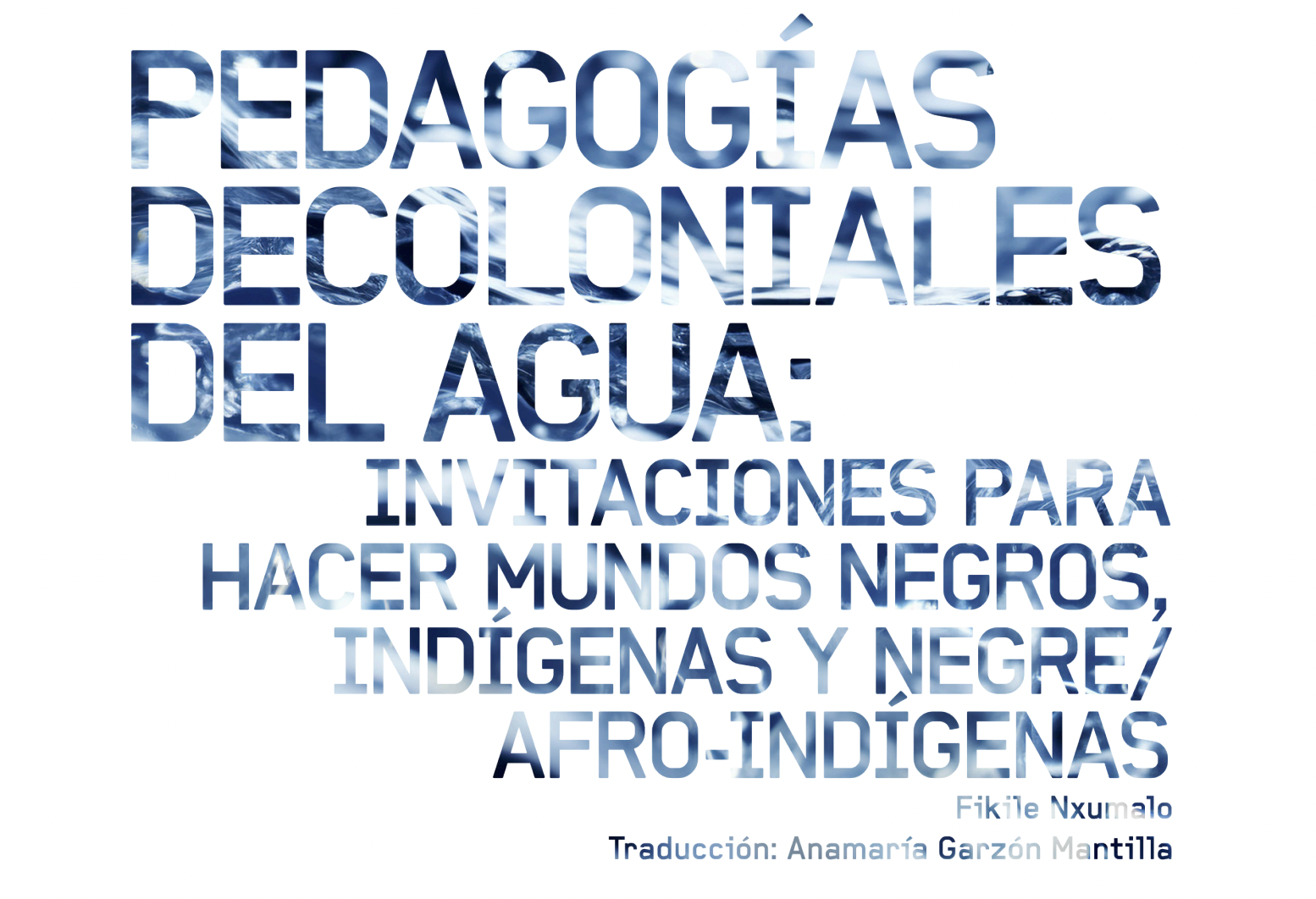Akademos

Publicado 2023-12-15
Palabras clave
- pedagogías decoloniales,
- agua,
- mundos más que humanos
Derechos de autor 2023 Fikile Nxumalo

Esta obra está bajo una licencia internacional Creative Commons Atribución-NoComercial 4.0.
Cómo citar
Nxumalo, F. . (2023). Pedagogías decoloniales del agua: invitaciones para hacer mundos negros, indígenas y negre/afro indígenas. Post(s), 9(1), 90-103. https://doi.org/10.18272/post(s).v9i1.3123
Resumen
En este artículo, comparto historias cotidianas de encuentros pedagógicos de jóvenes con el agua. Comparto estas historias como ilustraciones de pedagogías que acogen a los jóvenes en relaciones de cuidado con la vida más que humana. Me centro en el potencial decolonial de estos encuentros pedagógicos en relación con lo que activan para la construcción de mundos negros, indígenas y negre/ afro-indígenas.
Descargas
Referencias
- Bang, M., Curley, L., Kessel, A., Marin, A., y Suzokovich, E. (2014). Muskrat theories, tobacco in the streets, and living Chicago as Indigenous lands. Environmental Education Research, 20(1), 37-55.
- Bang, M., y Marin, A. (2015). Nature–culture constructs in science learning: Human/non-human agency and intentionality. Journal of Research in Science Teaching, 52(4), 530-544.
- Bernstein, R. (2011). Racial innocence: Performing American childhood and race from slavery to civil rights. New York University Press.
- Cairns, K. (2018). Beyond magic carrots: Garden pedagogies and the rhetoric of effects. Harvard Educational Review, 88(4), 516-537.
- Cajete, G. (2000). Native science: Natural laws of interdependence. Clear Light Publishers.
- Cecire, N. (2015). Environmental innocence and slow violence. Women’s Studies Quarterly, 43(1-2), 164-180.
- Chawla, L. (2015). Benefits of nature contact for children. Journal of Planning Literature, 30(4), 433-452.
- Collins, P. H. (2004). Comment on Hekman’s “Truth and method: Feminist standpoint theory revisited”: Where’s the power? En S. Harding (Ed.), Feminist standpoint theory reader: Intellectual and political controversies (pp. 247-254). Routledge.
- Collins, P. H. (2009). Black feminist thought: Knowledge, consciousness, and the politics of empowerment. Routledge.
- Finney, C. (2014). Black faces, white spaces: Reimagining the relationship of African Americans to the great outdoors. University of North Carolina Press.
- Habtom, S., y Scribe, M. (2020, Junio 2). To breathe together: Co-conspirators for decolonial futures. Yellowhead Institute. https://yellowheadinstitute.org/2020/06/02/to-breathe-together/
- Haraway, D. J. (1988). Situated knowledges: The science question in feminism and the privilege of partial perspective. Feminist Studies, 14(3), 575-599.
- Hawthorne, C. (2019). Black matters are spatial matters: Black geographies for the twenty-first century. Geography Compass, 13(11), e12468. https://doi.org/10.1111/gec3.12468
- Karera, A. (2019). Blackness and the pitfalls of Anthropocene ethics. Critical Philosophy of Race, 7(1), 32-56.
- King, T. L. (2019). The Black shoals: Offshore formations of Black and Native studies. Duke University Press.
- McKittrick, K. (2011). On plantations, prisons, and a black sense of place. Social & Cultural
- Geography, 12(8), 947-963.
- Nishime, L., y Williams, K. (Eds.). (2018). Racial ecologies. University of Washington Press.
- Nxumalo, F. (2018a, Diciembre 24). How climate change education is hurting the environment. The Hill. https://thehill.com/opinion/energy-environment/422720-how-climate-change-education-is-hurting-the-environment
- Nxumalo, F. (2018b). Situating Indigenous and Black childhoods in the Anthropocene. En A. Cutter- Mackenzie, K. Malone, y E. Barratt Hacking (Eds.), International research handbook on childhood nature: Assemblages of childhood and nature research (pp. 1-22). Springer.
- https://doi.org/10.1007/978-3-319-51949-4_37-2
- Nxumalo, F. (2019). Decolonizing place in early childhood education. Routledge.
- Nxumalo, F., y Berg, L. (2020). Conversations on climate change pedagogies in a Central Texas kindergarten classroom. En J. A. Henderson & A. Drewes (Eds.), Teaching climate change in the United States (pp. 44-57). Routledge.
- Nxumalo, F., y Cedillo, S. (2017). Decolonizing ‘place’ in early childhood studies: Thinking with Indigenous onto-epistemologies and Black feminist geographies. Global Studies of Childhood, 7(2), 99-112.
- Nxumalo, F., y ross, k. m. (2019). Envisioning Black space in environmental education for young children. Race Ethnicity & Education, 22(4), 502-524.
- Nxumalo, F., y Villanueva, M. (2020a). Listening to water: Situated dialogues between Black, Indigenous and Black-Indigenous feminisms. En C. Taylor, C. Hughes, y J. Ulmer (Eds.), Transdisciplinary feminist research practices: Innovations in theory, method and practice (pp. 59-75). Routledge.
- Nxumalo, F., y Villanueva, M. (2020b). (Re)storying water: Decolonial pedagogies of relational affect with young children. En B. Dernikos, N. Lesko, S. D. McCall, y A. Niccolini (Eds.), Mapping the affective turn in education: Theory, research, and pedagogies (pp. 209-228). Routledge.
- Nxumalo, F., y Vintimilla, C. D. (2020). Explorations of the tensions and potentials of de-centering the human in early childhood education research. Equity & Excellence in Education, 53(3), 271-275.
- Nxumalo, F., Vintimilla, C. D., y Nelson, N. (2018). Pedagogical gatherings in early childhood education: Mapping interferences in emergent curriculum. Curriculum Inquiry, 48(4), 433-453.
- Pérez, M. S., y Saavedra, C. M. (2017). A call for onto-epistemological diversity in early childhood education and care: Centering global south conceptualizations of childhood. Review of Research in Education, 41, 1-29.
- Roy, A. (2020, Abril 3). The pandemic is a portal. Financial Times.
- https://www.ft.com/content/10d8f5e8-74eb-11ea-95fe-fcd274e920ca
- Scott, J. (2020, Junio 2). What you should know about Black birders. The Conversation. https://theconversation.com/what-you-should-know-about-black-birders-139812
- Silin, J. (2017). Risking hope in a worried world. Contemporary Issues in Early Childhood, 18(1), 91-98.
- Tarpley, N. (Ed.). (1995). Testimony: Young African-Americans on self-discovery and Black identity. Beacon Press.
- Taylor, A. (2017). Beyond stewardship: Common world pedagogies for the Anthropocene. Environmental Education Research, 23(10), 1448-1461.
- Templeton, T. N., y Cheruvu, R. (2020). Childhood innocence for settler children: Disrupting colonialism and innocence in early childhood curriculum. The New Educator, 16(2), 131-148.
- Vergès, F. (2017). Racial Capitalocene. En G. T. Johnson, y A. Lubin (Eds.), Futures of Black radicalism (pp. 72-82). Verso.
